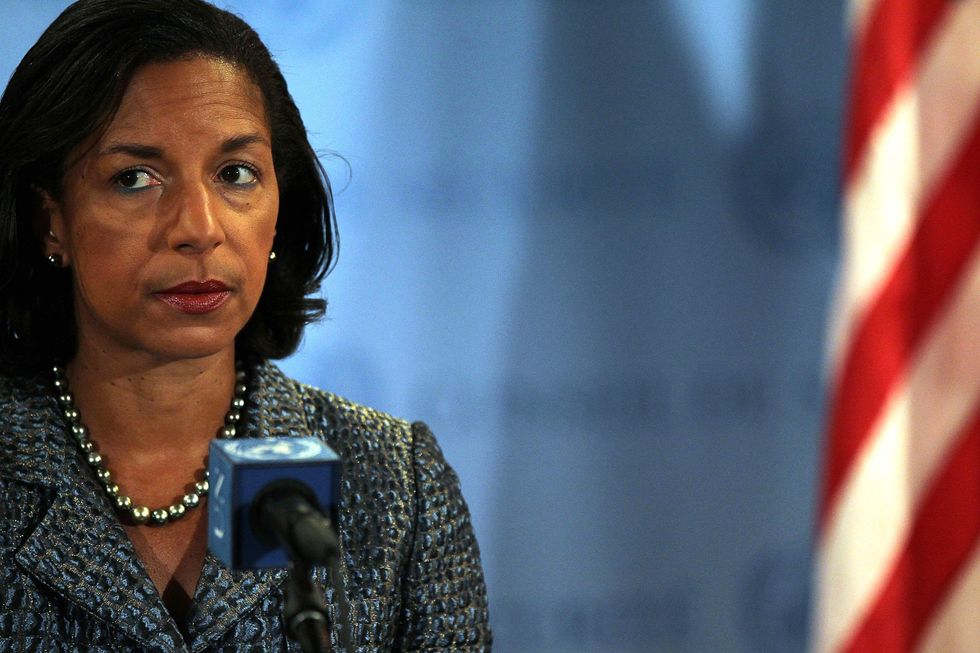Susan Rice, former U.S. ambassador to the United Nations and national security adviser to President Barack Obama, said the U.S. is less safe when the White House doesn't tell the truth, a statement for which Twitter users relentlessly mocked her, given her 2012 statements about Benghazi.
In 2012, Rice, who was then U.S. ambassador to the United Nations, went on five Sunday talk shows and blamed the attack on the U.S. consulate in Benghazi, Libya, which killed four Americans, including an ambassador, on an anti-Islam YouTube video. The Obama administration was later forced to walk back that narrative amid questions of a possible cover-up.
In light of the 2012 debacle, many social media users couldn't help but recognize the glaring irony of Rice's recent statements.
The Washington Post published Tuesday evening an opinion editorial written by Rice under the title, "Susan Rice: When the White House twists the truth, we are all less safe."
In the piece, the former Obama administration official calls out several false or misleading statements made by President Donald Trump's administration in its first two months, including President Trump's accusation that Obama had "wires tapped" at Trump Tower during the 2016 presidential campaign.
But FBI director James Comey said before the House Intelligence Committee Monday, that he has "no information to support" that claim.
Rice also singled out White House press secretary Sean Spicer for suggesting during a press briefing last week that Britain's GCHQ intelligence agency spied on Trump, a claim the British government called "utterly ridiculous."
"These false statements from the White House are part of a disturbing pattern of behavior that poses real and potentially profound dangers to U.S. national security," Rice wrote, adding that "first impressions matter, and an unsettling pattern has already been established."
The foundation of the United States’ unrivaled global leadership rests only in part on our military might, the strength of our economy and the power of our ideals. It is also grounded in the perception that the United States is steady, rational and fact-based. To lead effectively, the United States must maintain respect and trust. So, when a White House deliberately dissembles and serially contorts the facts, its actions pose a serious risk to America’s global leadership, among friends and adversaries alike.
Rice cited several examples of past presidents who have used the U.S.'s leadership to rally other countries in support of global causes, from George H.W. Bush removing Saddam Hussein from Kuwait in 1991 to George W. Bush leading the fight against al Qaeda after 9/11 to Obama taking it to ISIS.
Rice attributed each of these successes at rallying other countries to the U.S. being perceived focused on facts. She zeroed in on the Trump administration's controversial questioning of the relevance of NATO, as well as recent missteps when it came to long-held diplomatic policies, such as the one-China policy and two-state solution to the Israeli-Palestinian conflict in the Middle East.
"Our friends must be able to trust the word of the U.S. president," Rice said, citing leaders in France, Germany and Brazil taking Obama at his word when he said in 2013 that he was not aware of the NSA's eavesdropping on their personal communications.
Rice said the U.S.'s "perceived credibility" isn't just important when it comes to her allies, though. The seriousness with which America's adversaries and enemies take her also matter, she said.
Is Russia certain we will defend every NATO ally at all costs? Does China think we want a trade war or stable economic relations? Does Kim Jong Un fear we may use force preemptively to counter his nuclear and missile capabilities? The United States’ words matter. Critical calculations are based on our perceived credibility.
Americans too, Rice said, need to be able to believe Trump, lest "his ability to harness public support to confront a national crisis [be] undermined.
Still, it is possible to mitigate the long-term effects of this vacation from veracity — if the White House and the president quickly and convincingly return to the tradition of endeavoring to tell the truth from the Oval Office and the White House briefing room. If they do not, one is left to wonder whether the damage inflicted on U.S. global leadership is the deliberate derivative of the 'deconstruction of the administrative state' or simply the lasting consequence of compulsive mendacity. Either way, the United States’ national security will suffer.



